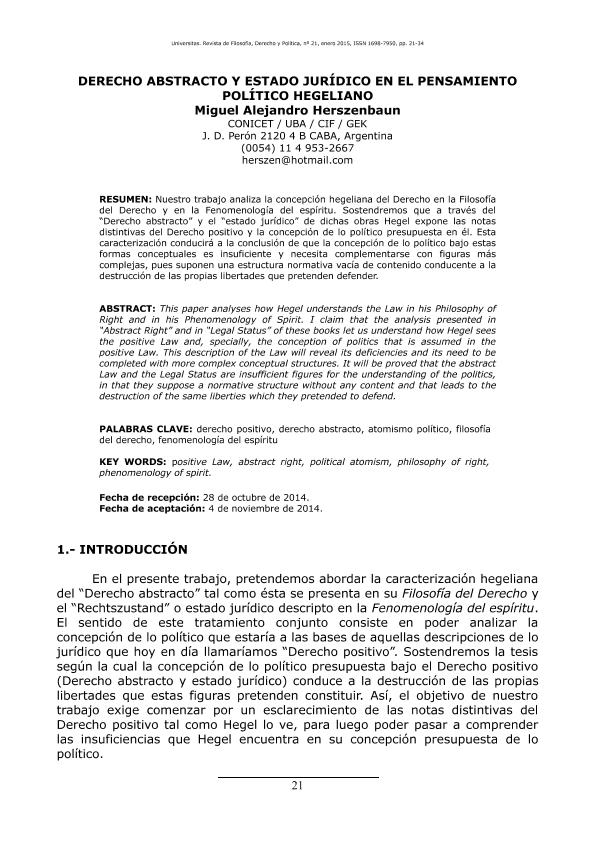Artículo
Nuestro trabajo analiza la concepción hegeliana del Derecho en la Filosofía del Derecho y en la Fenomenología del espíritu. Sostendremos que a través del “Derecho abstracto” y el “estado jurídico” de dichas obras Hegel expone las notas distintivas del Derecho positivo y la concepción de lo político presupuesta en él. Esta caracterización conducirá a la conclusión de que la concepción de lo político bajo estas formas conceptuales es insuficiente y necesita complementarse con figuras más complejas, pues suponen una estructura normativa vacía de contenido conducente a la destrucción de las propias libertades que pretenden defender. This paper analyses how Hegel understands the Law in his Philosophy of Right and in his Phenomenology of Spirit. I claim that the analysis presented in “Abstract Right” and in “Legal Status” of these books let us understand how Hegel sees the positive Law and, specially, the conception of politics that is assumed in the positive Law. This description of the Law will reveal its deficiencies and its need to be completed with more complex conceptual structures. It will be proved that the abstract Law and the Legal Status are insufficient figures for the understanding of the politics, in that they suppose a normative structure without any content and that leads to the destruction of the same liberties which they pretended to defend.
Derecho abstracto y estado jurídico en el pensamiento político hegeliano
Título:
Abstract Law and Legal Status in the Hegelian Political Thought
Fecha de publicación:
01/2015
Editorial:
Universidad Carlos III de Madrid. Instituto de Derechos Humanos Bartolomé de las Casas
Revista:
Universitas
ISSN:
1698-7950
Idioma:
Español
Tipo de recurso:
Artículo publicado
Clasificación temática:
Resumen
Archivos asociados
Licencia
Identificadores
Colecciones
Articulos(SEDE CENTRAL)
Articulos de SEDE CENTRAL
Articulos de SEDE CENTRAL
Citación
Herszenbaun, Miguel Alejandro; Derecho abstracto y estado jurídico en el pensamiento político hegeliano; Universidad Carlos III de Madrid. Instituto de Derechos Humanos Bartolomé de las Casas; Universitas; 21; 1-2015; 21-34
Compartir




